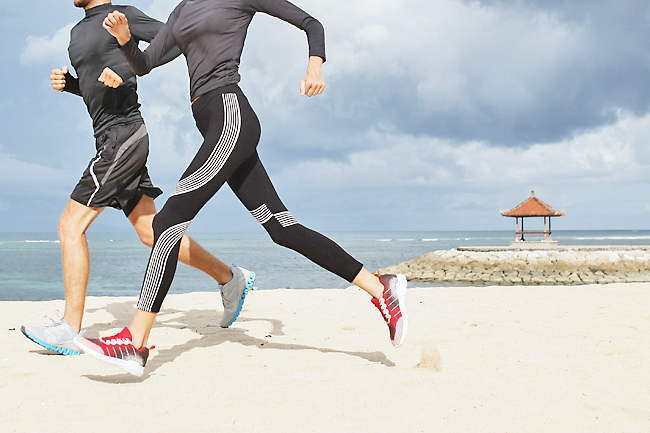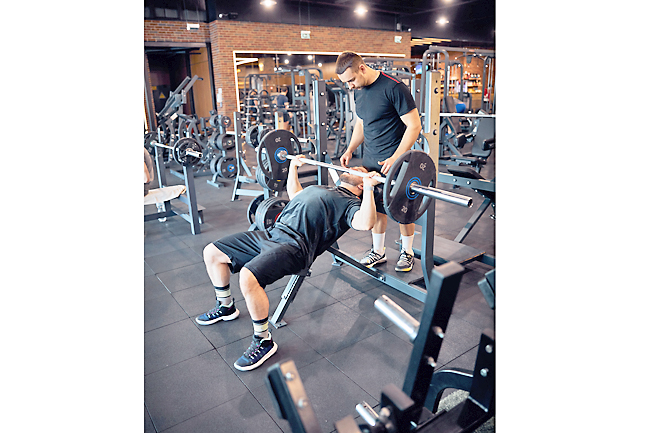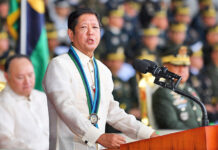Christie Aschwanden
CNA/THE NEW YORK TIMES – I was so tempted to skip the run. It was a Thursday afternoon in early December, and by the time my five Zoom meetings were done, it was getting dark and the sky was spitting sleet.
Still, I headed out the door, because my last call of the day had been with a couple of professional runners, each with multiple national championship titles in distance running under their belt.
A physician, Megan Roche, and her husband, David, had encouraged me to think of my workout as recess after a long day of work, rather than another item on my to-do list.
“I struggle with motivation all the time,” Dr Roche said. What gets him over the hump is finding joy in the activity itself. Sometimes it helps to get a little silly, he said.
“It sounds ridiculous, but if you’re running down a slight hill or even just tired, put your arms out like you’re an airplane and suddenly everything become less serious.”
It did sound silly, but when I tried the airplane arms trick, my dark, cold run became surprisingly joyful.
Here are some other ways you can find inspiration and maybe even a little glee in your daily workout.


DON’T THINK OF IT AS EXERCISE
When exercise isn’t appealing, making it feel like something else can help.
Psychologist at University of Southern Indiana, Evansville Crystal Steltenpohl, who studies exercise motivation, recalled a conversation she had with a participant in one of her studies who said, “I go play basketball, but that’s just hanging out with friends.”
In other words, although the activity qualified as exercise, that was just a fringe benefit, rather than the motivating factor.
I usually get the recommended 22 minutes per day of moderate-intensity exercise automatically, without ever thinking about exercise. I do my morning walk to clear my head, feel present in my surroundings and connect with my husband.
“If you ask, most people will say they want to exercise for their health, and that’s a great goal,” said exercise scientist at Kansas State University Katie Heinrich.
“But what gets people actually moving is doing something they enjoy.” There’s no perfect activity for everyone.
“How do you like to move?” Dr Heinrich said. “Maybe it’s dancing, or it could be a walk in the park. For some people, it might be CrossFit.”
Casey Johnston stumbled upon weight lifting through a Reddit thread by a woman starting a strength-training programme.
That post inspired Johnston, a health and science writer to try a similar programme. She discovered that she loved it much more than running.
Whereas running gave her too much time to ruminate over anxious thoughts, “You can’t think of anything else when you have 200 pounds on your back,” she said.
BUNDLE YOUR INCENTIVES
Last month, researchers published a megastudy testing the effectiveness of 54 different approaches to motivating people to exercise more.
The experiment, which enlisted more than 60,000 members of the 24 Hour Fitness chain as test subjects, found that offering a free audiobook was one of the most effective ways to get people to the gym.
The idea was to give participants something to look forward to while exercising, said one of the study’s organisers, Katy Milkman, a professor at the Wharton School of the University of Pennsylvania and author of the book How to Change: The Science of Getting from Where You Are to Where You Want to Be.
It’s an approach familiar to Dr Roche. She enjoys taking photographs, and running gives her an opportunity to look for interesting things to shoot, especially while travelling. “These photos carry me through my running journey,” she said.
MAKE EXERCISE A PRIORITY
“The number-one reason people give for not exercising is time,” Dr Heinrich said, and the only reliable way to find the time is to prioritise it.
“You have to make a decision to put exercise into your day, it’s not just magically going to happen.”
If you think of exercise as optional, you give yourself permission to skip it. Instead, try thinking of it as an essential part of your job, said author of The Practice of Groundedness and a frequent writer about human performance Brad Stulberg.
“Whether you are a parent, business person, physician, writer, artist, lawyer or educator, exercise will make you better at what you do,” he said. “It will help you focus, stay calm and collected, and improve your energy.”
BE FLEXIBLE
Making exercise a priority doesn’t mean you need a rigid schedule. A study Dr Milkman and some colleagues published in 2020 found that giving yourself flexibility to meet your goals might boost your chance of success.
Researchers studied more than 2,500 Google employees, randomly assigning some of them to get paid for going to the company gym during a window of time they had identified in advance as the most manageable, while others could opt to go anytime.
The researchers had expected that committing to specific times would help people form stronger habits, said lead author John Beshears, a behavioural economist at Harvard Business School.
Instead, the people who’d been given flexibility ended up going more often after the payments ended. When the group on the rigid programme missed their planned workout, they didn’t go at all, whereas the group that had practiced finding the time continued to do so.
GET SOME SUPPORT
“The best fitness motivator is a friend. They hold you accountable to show up and they support you when you don’t,” Stulberg said.
In one 2017 study, Dr Heinrich interviewed CrossFit gym owners and coaches and found that feelings of community were a strong motivator for people who continued with the classes.
“It’s not that you have to go, it’s that you want to go and are drawn in by the group,” she said. “If you work out alone, having someone to check in with can be helpful.”
CREATE AN ENVIRONMENT FOR SUCCESS
Look for ways to make your surroundings more inviting for physical activity, Dr Steltenpohl said.
Find or create a place where exercise feels enticing. That could be a gym, a park, a walking path or even just your bedroom with an exercise mat and a fitness app, she said.
The key is that your surroundings are priming you to succeed.
ANTICIPATE HOW EXERCISE WILL MAKE YOU FEEL
It’s tempting to think you’re too stressed or tired to exercise, but oftentimes exercise is exactly what you need to feel better.
Exercise can help you manage your moods, Dr Steltenpohl said, and when you’re feeling lousy, sometimes exercise is a powerful antidote. “When I get really frustrated, I find that’s a good time to take a walk.”
It’s a benefit that happens pretty quickly, she said, and it can create a positive feedback loop.



















































